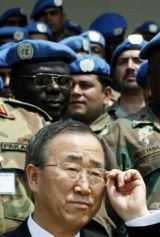UN, Sudan to work for peace, but no deal on Darfur force
March 29, 2007 (RIYADH) — U.N. chief Ban Ki-moon and the Sudanese president reached an agreement to work out U.N. logistical and financial help for African peacekeepers in Darfur and to boost the beleaguered peace accord in Darfur, the Arab League said Thursday.
 But it appeared Ban was unable to win President Omar al-Bashir’s acceptance of a U.N. force in the war-torn region during talks on the sidelines of an Arab League summit in the Saudi capital, Riyadh.
But it appeared Ban was unable to win President Omar al-Bashir’s acceptance of a U.N. force in the war-torn region during talks on the sidelines of an Arab League summit in the Saudi capital, Riyadh.
Saudi King Abdullah and Arab League chief Amr Moussa joined the talks Wednesday, as the U.N. head tried to enlist Arab support in persuading al-Bashir.
Hours before the meeting, al-Bashir sharply rejected any U.N. deployment in a speech to the summit, repeating his stance that the U.N. role must be limited to logistical and financial help for African Union peacekeepers in Darfur.
The U.N. and Sudan reached an agreement in November that called for a joint U.N.-African Union force of some 20,000 peacekeepers, but since then al-Bashir backed off the deal, saying he would only allow a larger AU force.
The undermanned and underequipped 7,000-strong AU force in Darfur has been unable to stop violence in the region, where more than 200,000 people have been killed in nearly four years of fighting between the government and ethnic African rebels.
The violence has only increased since a peace deal last year reached in the Nigerian city of Abuja, signed by the government and one rebel group. Other rebel groups rejected the deal and continued fighting.
During the Riyadh talks, Ban and al-Bashir agreed “practical measures to reduce the obstacles preventing the speeding up of implementing the Abuja peace accord” and the later U.N.-Sudan deal, the Arab League said in a statement Thursday.
The sides agreed to “define the size of the African forces and their weaponry as well as the logistical and technical support, supervision, financing and the ways of participation by the United Nations,” it said.
They also agreed to work to “bring groups that have not signed the Abuja accord into the political process to speed up national reconciliation.”
The international community has struggled for months to win al-Bashir’s acceptance of the U.N. force. A Security Council resolution calls for a U.N. force, but only with Khartoum’s consent.
Al-Bashir’s government is accused of backing Arab janjaweed militiamen blamed for widespread atrocities against ethnic African civilians in a campaign of violence aimed at putting down the rebellion. More than 2.5 million people have been driven from their homes in the large, barren region of western Sudan.
In his speech to the Arab summit on Wednesday, al-Bashir slammed U.N. resolutions calling for U.N. troop deployment in Darfur as “a violation for Sudan’s sovereignty” and said they “provoke the conflict in Darfur, instead of finding a solution for it.”
(AP)
